I'm watching friends—some I've known since childhood—having daily breakdowns over the actions of elected and appointed officials of the United States government.
I'm not feeling their level of freaking the f*ck out.
Some people have noticed.
“How are you so calm‽‽”
They were expecting more from me given my outspoken nature since, well, since I started talking.
My family says I was born a 40-year-old Indigenous Auntie. Maybe it's generational trauma, maybe it's autism. Either way, it works for my ability to survive.
My friends expected daily diatribes, more outrage, more memes, more something now that things “really are bad.” But instead, my reaction hasn't ramped up since candidate Trump and MAGA first appeared on the political landscape.
They don't realize that where they see a new, unimaginable horror has just happened, I see a Thursday session of Congress.
Been There, Seen That
I feel somewhat of an advantage as this isn't a first in a lifetime feeling for me.
Indian Wars, extermination policies, assimilation laws, reservations, boarding schools, experimentation, sterilization, ongoing adoption/foster care scoops, ongoing land grabs, ongoing treaty violations…
I gotta go pre-contact to find a time when some invader/colonizer/settler governing entity wasn't targeting us for destruction.
“How are you so calm‽‽”
First Timers
But I watch a majority who never, ever in their lives felt a target on their own backs melting down over even the remote possibility their privileged position isn't as secure as they always assumed.
Most don't even realize that's why they're so upset right now.
They never recognized their privilege. They just lived their lives secure in its presence.
I said in a group of BIPOC folks that I'm significantly less freaked out than the majority of people I interact with because this feels familiar to me.
I grew up knowing some other shoe was always going to drop. That's probably why mental health is a serious issue among Indigenous Americans.
Sure, a lifetime of anxiety, depression, and panic disorders is a bitch. But, damn, we're emotionally prepared when the isht hits the fan.
Same Old, Same Old
My paternal Great-Great-Huŋkáke (literally Great-Great-parents meaning Great-Grandparents since Lakȟótiyapi doesn't have a word for Grandparents as one unit) were the first generation to not live as free, nomadic Lakȟóta.
Their Huŋkáke's (parents’) generation grew up in tipis and hunted buffalo as part of the Oglala Lakȟóta tribe of the Očhéthi Šakówiŋ Nation. Some of my G-G-Huŋkaké were old enough to have childhoods as free people.
My life overlapped only briefly with my G-G-Huŋkaké, but I had decades with their wakȟáŋyeža (children) and tȟakóža (grandchildren) who could tell those stories and learned of that trauma of being ripped from their homelands, herded like cattle, and penned like livestock while being starved to death just for being on this continent first.
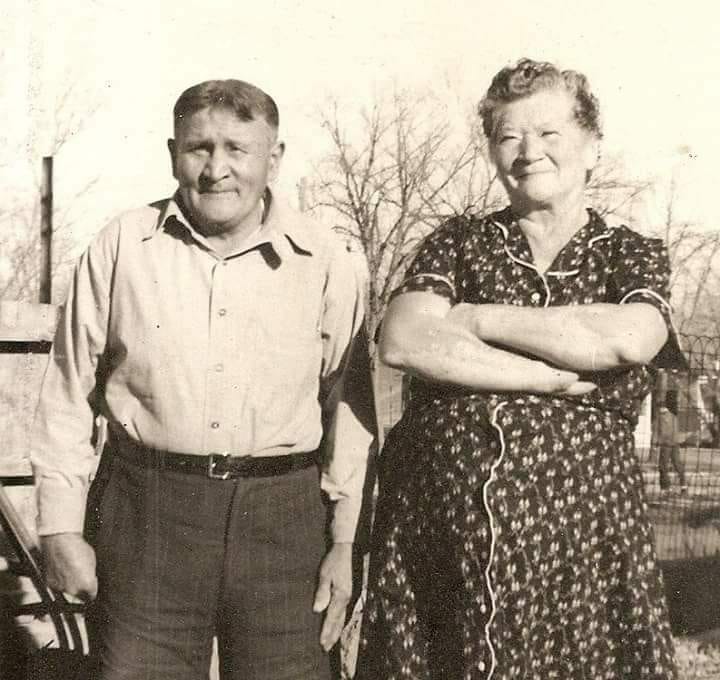
Mituŋkaŋŝila (my Great-Grandfather) Charles Roan Bear earned his headdress as a 15-year-old defeating George Custer and the U.S. Army's 7th Cavalry at Pȟeží Sla Wakpá (Greasy Grass River, or Little Bighorn for non-Lakȟóta) where the Army attacked “a large encampment” of Natives on June 25-26, 1876.
My Até (Father) used to spend summers splitting time between the Gerrys, his maternal Uŋčí and Lala (less formal form of Grandpa), and with the Roan Bears, paternal Lala Charlie” and Uŋčí Kate.
Lala Charlie was Uŋčí Kate's third husband, but Lakȟóta kinship doesn't make distinctions between full, adopted, and half-siblings or stepfamily. There are no terms for it nor any acknowledgement culturally of a difference in relationship.
Miaté heard from Lala Charlie the stories of life before and after the battle that was initiated by the U.S. Army on unceded Lakȟóta treaty land.
"Unceded lands" refers to Indigenous territories never legally surrendered to a colonizing power by treaty or other agreement. “Unceded treaty lands” refers to Indigenous territories that a colonizing power legally acknowledged as being Indigenous land in perpetuity.
Tuŋkaŋŝila Charlie, his Huŋkáke, his tiospayé (extended family) were just living their lives on land the U.S. government signed legally binding papers about, saying it would always be for just the Očhéthi Šakówiŋ to live on and take care of. And that same government sent their Army to remove them from that land.
The government was being pressured to contain the Lakȟóta to ever decreasing areas to allow gold miners to encroach on their sacred lands in the Paha Sapa (Black Hills) of what's now South Dakota and for homesteaders and ranchers to squat on their lands throughout the Great Plains.
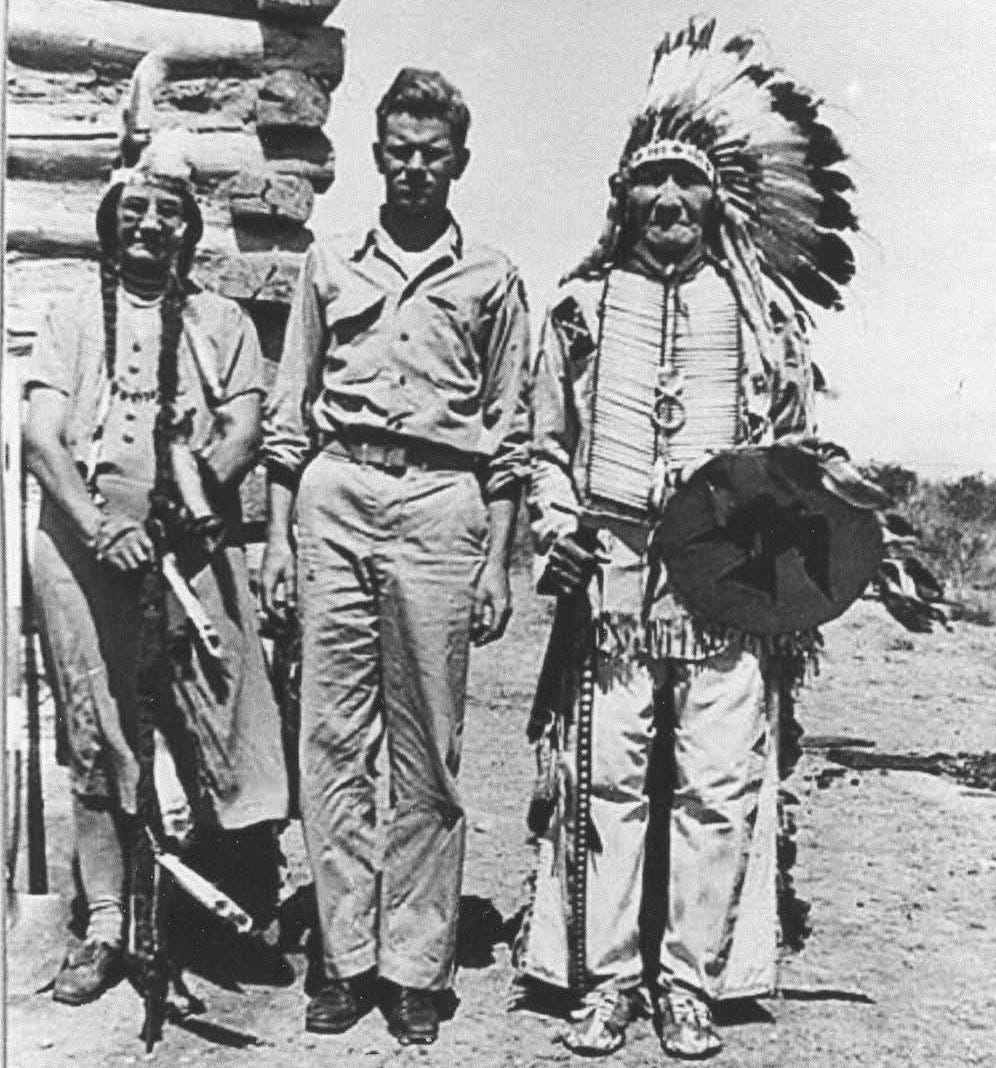
Lakȟóta lived in tipis, so the “encampment” the Army reported targeting for attack was a large village of women, children, and elders—not just men of fighting age—living their damn lives on their own land.
The 7th Cavalry attacked a group of mostly non-combatants in their homes on June 25, 1876, and got their asses handed to them.
Retaliation took the form of increased Army attacks and the slaughter of mostly unarmed Lakȟóta women, children, and elders during Christmas time at Čhaŋkpé Ópi Wakpála (Wounded Knee Creek) in 1890. Photos of the dead and dying show children laying on straw in a church surrounded by Christmas decorations.
This attack by the U.S. Army also occurred on unceded Lakȟóta treaty land.
And forget what you were taught about westward expansion being driven by settlers looking for a little house on the prairie. Most passed through headed to the West coast, or stuck to land already inhabited by White descendants of colonizers—which was not the land seized in violation of treaties signed with tribes throughout the midwest.
Until after WWII, much of the land seized remained unpopulated. Much of it remains so today in the states of South Dakota, North Dakota, Wyoming, and Montana—the land the Lakȟóta were slaughtered for.
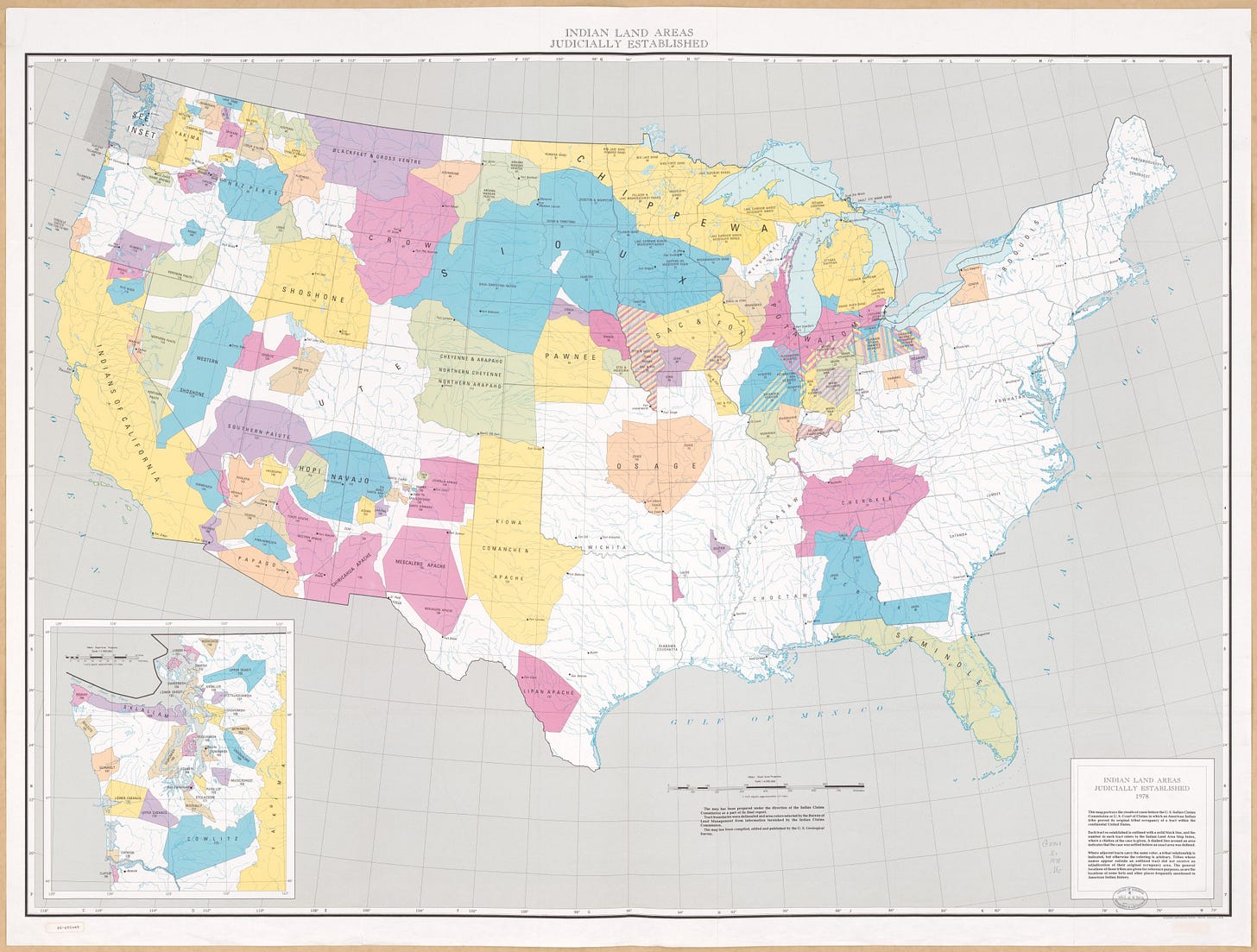
Further retaliation against “unruly Indians” came just three years after the 7th Cavalry's 1876 loss when in 1879 Congress established Carlisle Indian Industrial School in Pennsylvania to “kill the Indian” and “save the man.” Christian missionary schools that predated the federally-run system—also aimed to assimilate Indigenous children—were incorporated by the government into their efforts and more were opened with federal financial backing.
Christian nationalism supported by the federal government's agents and taxes is brand new? Hardly.
All tribes of the Očhéthi Šakówiŋ—Nakȟóta, Dakȟóta, and Lakȟóta—were targeted for the first class at Carlisle along with the Cheyenne, Kiowa, Pawnee, and Apache—all tribes that made the mistake of defending their homes and trusted government treaties.
To publicize their good deeds, Indian boarding schools photographed filthy, frightened, starved children straight out of train boxcars after trips of sometimes days. Then the same children would be photographed again after being given their civilized savage makeover.
The photos were gifts for donors or sold to raise funds.
My younger paternal G-G-Huŋkaké, Huŋkaké (grandparents), Até, Tȟuŋwíŋ (Aunties), and Até (my Father’s brother is also my Father, not my Leksi/Uncle) all survived years in the Indian Boarding School system.
Most attended the Catholic run Holy Rosary School at Pine Ridge, in South Dakota.
Tuŋkaŋŝila Edward Gerry was shipped as freight by train from South Dakota to Haskell Indian School in Kansas where he was an underclassman to a kid named Jim Thorpe. Lala Gerry, who once sang with the Porcupine Singers, used to tell stories of Jim Thorpe's athletic prowess.
Thorpe was taken to Haskell from the Sac and Fox Tribal Nation out of Indian Territory (now Oklahoma) because he kept running away from boarding school. Thorpe ran away from Haskell, too, and eventually ended up being sent to the more secure Carlisle indoctrination camp-oops, I mean “school.”
If you don't know who Jim Thorpe is, JFGI (Just F*cking Google It).

My Mother's people relocated multiple times from Quebec to New Brunswick to avoid life on reserves and all that came with it, losing their cultural and language ties in the escape, adopting French in its place, like many Indigenous Canadians.

My Ista (Mum) and Até both avoided the Indigenous child scoops taking place during their childhoods in Canada and the United States. The scoops came in waves, with the 60s scoop in Canada being one of the most well-known.
Indigenous children at boarding or residential (the Canadian term) schools were sold to White families either as labor or a novelty adopted child paraded around as acts of charity by Christian parents. Other children were abducted at hospitals at birth with some mothers being told their child died.
Packaged as saving the children, it was—and still is—a highly profitable enterprise for all involved.
Today, most of the children are abducted through the foster care system. In the United States, the Indian Child Welfare Act (ICWA) was created to curb human trafficking of Indigenous children by state and local governments and Christian organizations.
Every challenge to ICWA has come from Christian nationalists who call the law racist.

As a 4-year-old my Akenistén:’a (Mother), after her Mère (Mother) died, was adopted by her Tante (Aunt) Amelia—who lived in Maine and had a White, English-speaking husband, making the cross border adoption far easier.
It was clear the government wouldn't allow a Native widower to keep his daughters. My Ista and Akohtsí:'a and Ontate'kén:'a (her older and younger Sisters) were each placed with family members outside the government's reach as soon as possible.
Some people will say:
“But it's all so long ago!”
I attended college with the last of the boarding school kids.
I know firsthand about MMIWG2S, the many missing and murdered Indigenous peoples, having lost a childhood friend—Virginia Pictou Noyes—to it.
Indigenous children are still being stolen.
I grew up with a direct oral history of being targeted, hunted, killed by agents of the U.S. and Canadian governments.
“How are you so calm‽‽”
Sheeeet… this is just a new day, different genocide for Indigenous Americans.
Solidarity Doesn't Require Equal Energy
White people might be noticing the reactions to current events from a lot of BIPOC don't match their own. We noticed the same—in reverse—when we warned everyone about Trump 2.0.
This isn't happening because of strong BIPOC support for MAGA. Sure, he's got some fans among conservative, Catholic Latinos and Evangelical Blacks being led by their pulpits, and oil/casino rich Republican Natives.
But all BIPOC voting blocs combined couldn't have made this happen.
So there's definitely some, “We told you so” fatigue that you're getting right now. There's definitely some, “Oh, now you're concerned?” vibes being felt.
But the largest voting bloc in the last election were people who didn't bother to vote at all.
Apathy and picking the White guy because that's the safe, familiar, comfortable status quo got us all in this boat.
Yeah, it's sinking.
But you'll have to understand why some people are securing their life vests instead of helping you bail water.
We recognize what's happening.
Many of us even empathize with your anxiety, panic, and depression.
Just because I don't share your level, doesn't mean I'm not in the fight with you.
“How are you so calm‽‽”
This has been my life—feeling targeted and unsafe—my entire life. Welcome to my world.
Gather your wits. Recognize that going back to “how things were” isn't appealing to most BIPOC. We’re not interested in righting this sinking ship—we'd rather invest in an upgrade. How things were kinda sucked for us—we're not interested in fighting to get back to that.
How it was, was broke. Now's a great time to fix this and vote the status quo champions—Republicans AND Democrats—out of all levels of government.
So, skoden.
Stoodis.
Together.
💛🤍🖤❤️ 💛🤍🖤❤️ 💛🤍🖤❤️ 💛🤍🖤❤️
Can't afford to subscribe, but still want to contribute to my ability to create?
A little support goes a long way! If you’d like to help me keep creating, you can do so at KoFi.


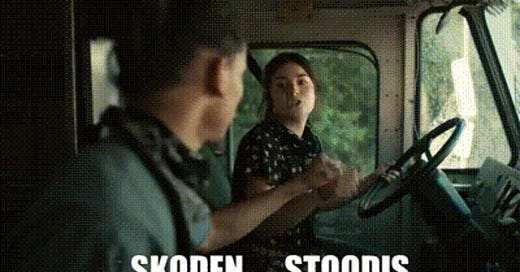



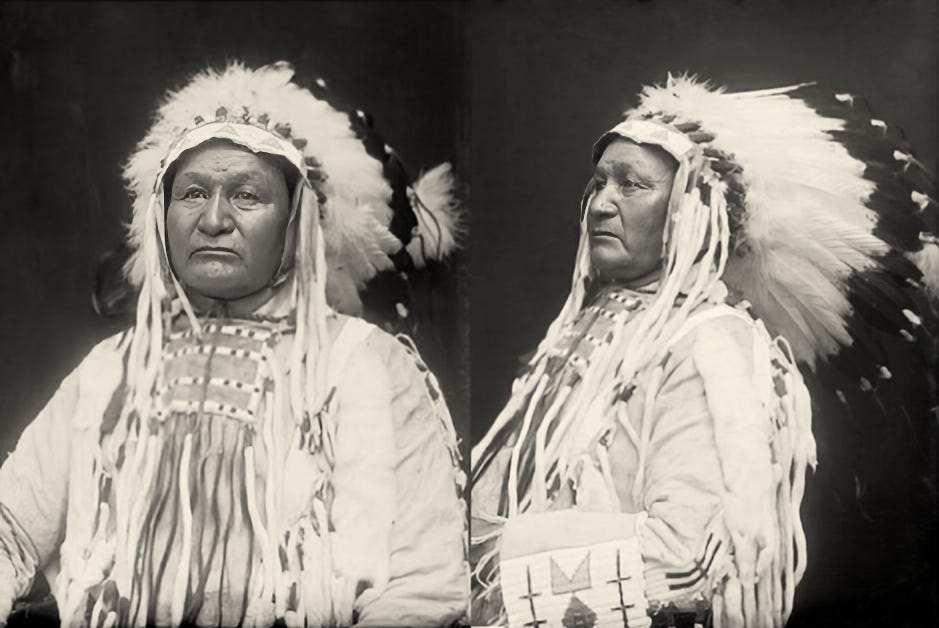
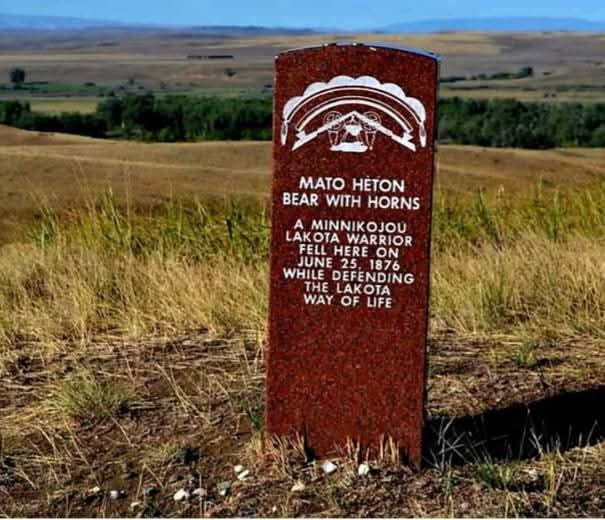



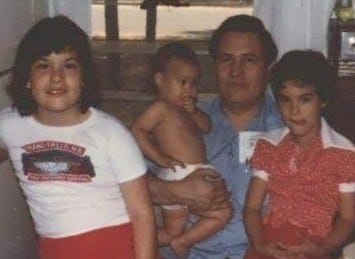

Thank you. I remember what a staff member at the Native American Rights Fund said several years ago toward the end of the Indian Trust Funds litigation: "Social Security is a trust fund." You're still here, and I'm so glad. I hear some of the voices of my ancestors, but I hear the Native American voices more clearly now, and they come together with the best voices of my ancestors. Thank you for speaking.
Thank you for the lesson about your culture and history. The first time I learned anything about forcing indigenous children to attend boarding schools to indoctrinate them in white culture, was about 1994. I was taking a Sociology course. I was in my 40s. There's so much of our shared history that Americans know nothing about.
We are rightfully worried about the dumbing down of our national education system. But as an old person I can tell you, there's so much that I wasn't taught either!